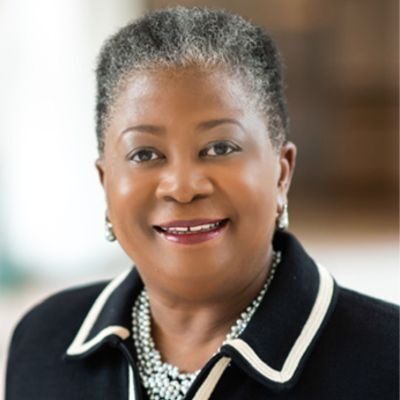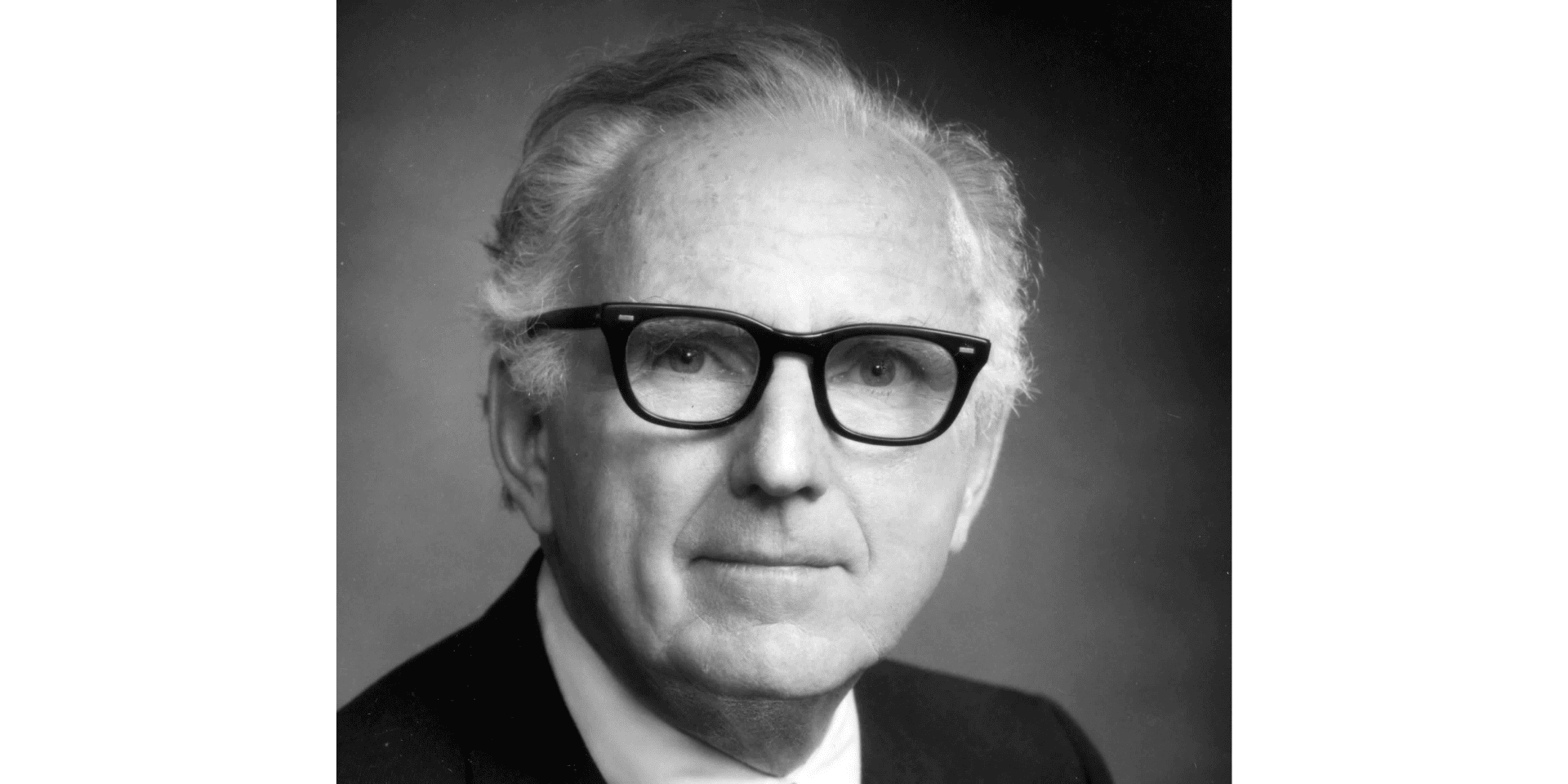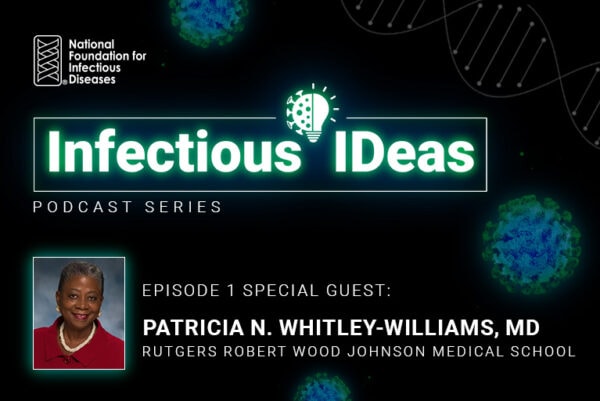The John P. Utz Leadership Award honors individuals who exemplify and support NFID leadership goals, through service to NFID and/or the field of infectious diseases.
Patricia N. Whitley-Williams, MD, who recently retired from Rutgers Robert Wood Johnson Medical School, received the 2025 John P. Utz Leadership Award in recognition of her longstanding service to NFID and her unwavering commitment to advancing health equity and community engagement in vaccine research and communication. A nationally respected pediatric infectious disease expert, Whitley-Williams has served NFID in numerous leadership roles, including as past president. An active member of the Pediatric Section and the Vaccine Advisory Committee of the National Medical Association, she has been an advocate for updating physicians from communities of color and promoting immunizations in marginalized communities. As a member of Delta Sigma Theta Sorority, Inc., a public service organization, she is engaged in community outreach. Beginning her career when pediatric HIV was first discovered, her work has spanned from pre-antiretrovirals to prevention of mother-to-child transmission to HIV prevention. She has mentored many pediatricians, residents, and medical students. Board-certified in pediatrics and pediatric infectious diseases, she is a fellow of the American Academy of Pediatrics. “Patricia Whitley-Williams is the voice of the people, a champion for women, people of color, and those new to medicine,” said NFID Immediate Past-President Patricia (Patsy) A. Stinchfield, RN, MS, CPNP. “She has been a tireless advocate for ensuring that vaccine clinical trials reflect the full diversity of the populations they are intended to protect and has worked to expand access to accurate, trustworthy information through outreach to underserved communities.”
Tribute Video
Acceptance Speech
An Interview with Patricia Whitley-Williams
What is your greatest professional accomplishment?
Being appointed chair of the Department of Pediatrics at the Rutgers Robert Wood Johnson Medical School was my greatest professional achievement. It was a privilege and honor to lead a group of committed faculty, trainees, and staff in a complex institutional system while also serving as medical director for the Bristol-Myers Squibb Children’s Hospital at the RWJ University Hospital. In an increasingly competitive environment, the achievements of the department included programs that continue to shape pediatric care and research, from launching the first Pediatric Trauma Center and Genetic Counselor Program in New Jersey to expanding research, training, and specialty care that benefit children and families statewide.
What has been your greatest professional challenge?
The greatest challenge I have faced is the rise of vaccine hesitancy, which intensified during the COVID-19 pandemic and was especially evident among communities of color. Why has this happened? Access to social media, which can facilitate the spread of myths, misinformation, distrust, and systemic inequities has played a significant role. This moment underscores the urgent need for culturally competent care, stronger and more effective communication, and a more diverse healthcare workforce. By advancing education, building trust, and empowering future healthcare professionals, the public health community can address hesitancy and help ensure that vaccines continue to protect the health of all communities.
Can you describe a situation that has had a profound impact on you?
I had the opportunity to participate in a 6-week experience in South Africa as part of the Baylor College of Medicine International Pediatric AIDS Initiative to combat the HIV/AIDS epidemic. We were introducing antiretroviral therapies for children for the first time in a rural district that had the highest incidence of HIV/AIDS in the country. I had previously worked in the townships around Johannesburg conducting HIV prevention activities alongside the traditional healers. The quality of life in this rural area with dire poverty was so poor. Yet the introduction of lifesaving antiretroviral therapies and the prevention of maternal-to-child transmission in this impoverished setting was promising and would prove to save hundreds of lives in this district alone. There were few doctors in this area, so much of the care was provided by nurses and community health workers who did the counseling and testing in mobile units and the township clinic. Of course, the support for a structure to deliver this care required funding from many global sources, including PEPFAR (the US President’s Emergency Plan for AIDS Relief) and the Elizabeth Glaser Pediatric AIDS Foundation.
This experience had a profound impact on me as it was a mixture of dire despair and yet surmountable hope.
Who has had the greatest impact on your professional development?
There has not been just 1 person; there have been many along the way and at different phases of my career. My ‘village’ includes the academic pediatricians of the National Medical Association, some of whom were peers on the academic ladder and others who paved the way. I am truly grateful for their years of support and guidance.
I was inspired to work in the field of infectious diseases by 2 people: First was Anne Coghlan, PhD, my microbiology professor at Simmons College, who believed in me, encouraged me, and supported my application to medical school. I will never forget her kindness and her brilliance as a microbiologist, teacher, and mentor. Second was Jerome O. Klein, MD, one of the early pediatric infectious disease specialists and my fellowship director at Boston Medical Center/Boston University School of Medicine. He remained a mentor and friend throughout my career.
Who do you most admire, and why?
I admire my parents, David and Mildred Whitley, and wish they had lived to share in my accomplishments. They planted in me the values of helping others, staying true to myself, embracing different cultures, and using my talents to the fullest. My father, a World War II veteran from Louisville, KY, became a civil engineer and later Boston’s first Black tax assessor. My mother, born in Boston to Jamaican immigrants who came through Ellis Island in the early 1900s, worked as a secretary for the Massachusetts office of the African Methodist Episcopal Church. Both were community activists, church leaders, and Girl Scout troop leaders, beloved by many.
My siblings and I enjoyed a childhood rich in family, culture, and education, growing up among Caribbean immigrants and African Americans. Our home welcomed exchange students from Ghana, Eritrea, and the UK. I am blessed with a loving younger sister, Pamela, and cherish the memory of my late older brother, David. Music filled our home. My father played piano and violin, and my mother sang contralto in Gilbert and Sullivan productions at the Robert Gould Shaw House Community Center.
What are the greatest threats and opportunities for the profession?
The greatest threats we face continue to be the emergence of new infectious agents, along with viruses such as HIV, SARS-CoV-2, influenza, and Ebola. Antimicrobial resistance remains a major concern, as does the resurgence of vaccine-preventable diseases like measles, which has returned in recent US outbreaks. Globally, tuberculosis persists as one of the most daunting challenges. Without a highly effective vaccine, it will remain a persistent threat worldwide.
At the same time, remarkable opportunities lie ahead. Advances in vaccine technology offer the potential to protect against both emergent and ongoing threats. Yet, as I have learned throughout my career, developing vaccines is not enough if vaccine hesitancy continues to grow. As NFID Past President Walt Orenstein, MD, someone I have long admired, has wisely said, “Vaccines don’t save lives—vaccination saves lives.”
What are the greatest changes you have seen since your career began?
It has been exciting to witness the rapid growth of technology in vaccinology and molecular diagnostics. Since I began my career, younger pediatricians have never seen a case of measles or Haemophilus influenzae type b (Hib) meningitis. They perform far fewer lumbar punctures, thanks to the introduction of Hib and conjugate pneumococcal vaccines for infants.
I began my career at the start of the HIV/AIDS epidemic, when many people, including young adults, infants, and children, were dying in the prime of life. Over time, new diagnostic tests and a deeper understanding of HIV transmission and prevention brought about a remarkable transformation. I had the privilege of serving on the safety and monitoring board for a large clinical trial that was terminated early because of a significant reduction in mother-to-child transmission among those receiving treatment. This remarkable discovery dramatically decreased the number of US babies born with HIV each year.
I remain deeply grateful to the thousands of unnamed patients—many from communities of color—who participated in clinical trials in the US and around the world. Their personal contributions to science have led to millions fewer HIV infections globally.
Knowing what you know now, what if anything would you do differently?
I have no regrets. I love pediatrics and infectious diseases. I am honored and deeply humbled to have had a profession that allowed me to interact with my patients and their families and to advocate for improving their health and overall lives. I have learned so much from my patients and their families.
When I saw my patients with HIV for the last time in clinic this past June—many of whom I had cared for over the past 25 to 30 years—it was difficult to say goodbye. I thanked them for enriching my life in countless ways. Some were born before any treatments existed and are true survivors. Others still live with the long-term effects of TB meningitis or HIV encephalopathy. This remarkable group of children witnessed many of their peers die from HIV complications and endured unspeakable stigma and adversity. They are the true heroes.
While not a regret, I would have participated in the Epidemiologic Intelligence Program at the Centers for Disease Control and Prevention if I had to do it all over again.
What is your advice for the next generation of infectious disease professionals?
Pediatric infectious diseases is a rewarding specialty, offering diverse and meaningful career paths. We are highly regarded as the investigative specialty, called upon to solve complex cases and unknown diagnoses. We are superb clinicians and master teachers. I encourage young trainees to stay curious, ask questions, and follow their passion to develop strong epidemiologic and research skills early in their careers. Our work to make the lives of all people as healthy as possible and free from bias is never done.
Any additional thoughts?
I have been fortunate to work as a physician. Not only have I enjoyed my patients but also the many wonderful people I have met along the way who are working to create a healthier world. My favorite quote, from Maya Angelou, is “The truth is, no one of us can be free until everybody is free.”
For additional perspectives from Patricia N. Whitley-Williams, MD, listen to the inaugural episode of the NFID Infectious IDeas podcast, Health Disparities and Vaccine Hesitancy:



